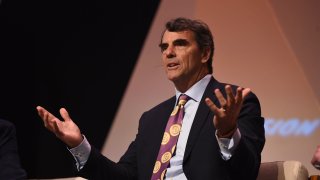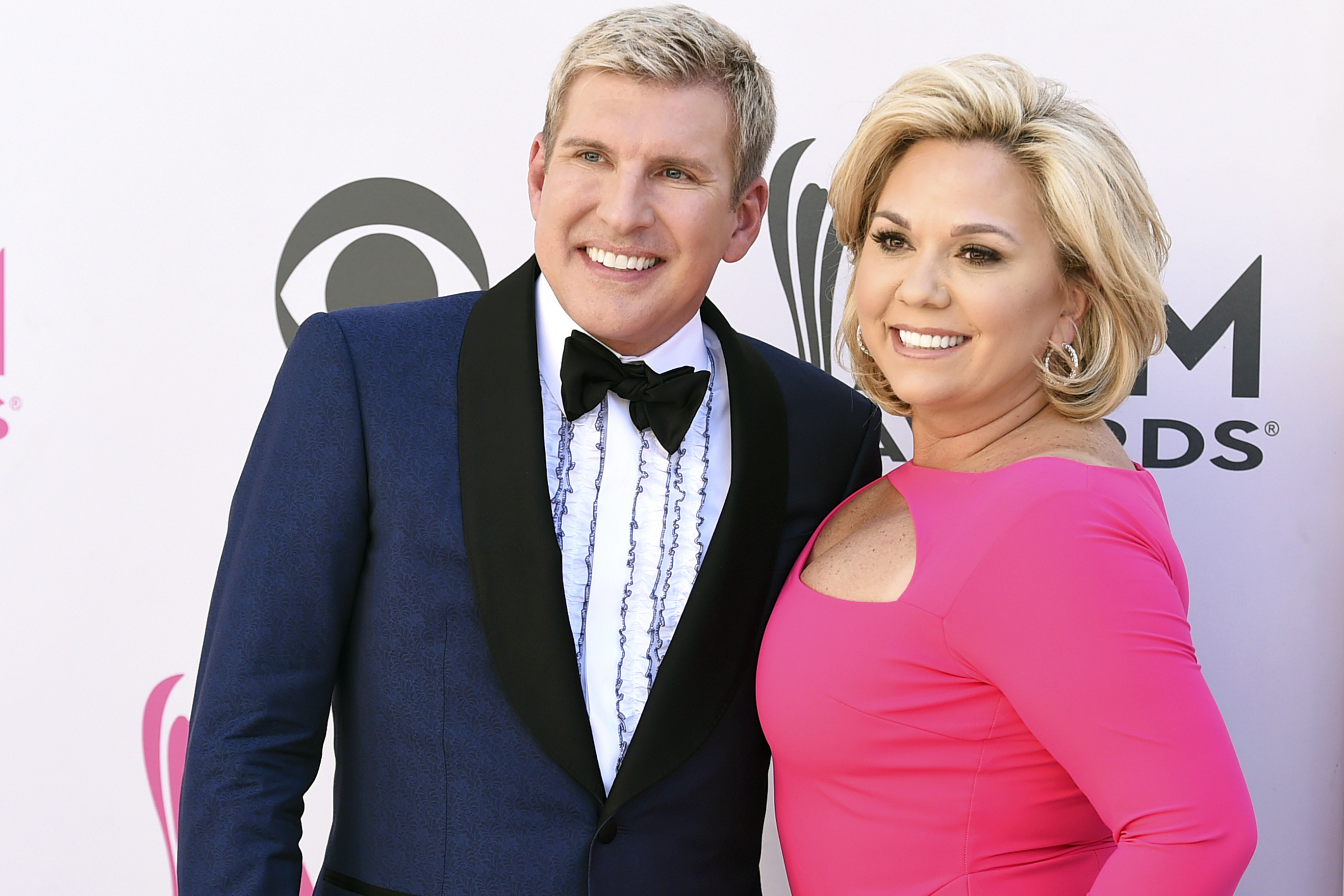
This story is part of the Behind the Desk series, where CNBC Make It gets personal with successful business executives to find out everything from how they got to where they are to what makes them get out of bed in the morning to their daily routines.
Billionaire Tim Draper wants you to have his email address.
"I'm at tim@draper.vc," he tells CNBC Make It. He gives it out to everyone because he likes helping people and it keeps him on top of his game.
"I end up learning things that I never imagined I'd want to know," Draper says.
Get Connecticut local news, weather forecasts and entertainment stories to your inbox. Sign up for NBC Connecticut newsletters.
Draper is a legend in the world of venture capital. Since the mid-1980s, he has built a fortune making early investments in companies like Hotmail, Skype, Baidu, Tesla and SpaceX.
He is also a vocal advocate of and investor in bitcoin and blockchain technology. In 2014, he purchased early 30,000 bitcoin seized by the U.S. Marshals (bitcoin was worth around $600 at the time) and he says he has invested in over 50 cryptocurrency-related companies. He's led investments in Coinbase, a cryptocurrency exchange that went public in April, Ledger, a cryptocurrency wallet maker; and Tezos, an open-source blockchain platform, to name a few.
Entrepreneurship and investing run in Draper's blood.
U.S. & World
Draper's grandfather, William Henry Draper, Jr., co-founded the first Silicon Valley venture capital firm in 1959, while his father William Henry Draper III (known as Bill) founded Draper & Johnson Investment Company in 1962 and Sutter Hill Ventures in 1964.
Draper started his own early-stage VC firm Draper Associates in 1985, which would grow into Draper Fisher Jurvetson (it was later renamed DFJ and then Threshold), and later Draper University, a school for early-stage entrepreneurs in San Mateo, California in 2012. In 2013, Draper left DFJ to focus on Draper University and his sole VC Draper Associates.
"I've made a series of good investments," Draper says. "I think that helps people want to go with an investor who has made some good picks."
Here, Draper talks about growing up, what he looks for in entrepreneurs to invest in and the routine that helps him succeed.
On growing up: My childhood 'was very free'
I always wanted to be an entrepreneur. I sold apples by the roadside [growing up in Atherton, California, which is now known as the epicenter of Silicon Valley money] and I had an oyster delivery business. I always had a bunch of little start-up businesses that would occasionally make me money and most of the time just keep me busy.
My childhood was great and it was very free. I worry when people don't allow their kids to do anything, and you're worried about this and this.
I'm going to give my mother a lot of credit here. My mom just said, "go explore." I think she may have just wanted me out of her hair but for me, that was like, "Wow, the world is completely open."
When I was 14, she and her friend dropped us off at the base of Mount Rainier. My friend was 15. And they had helped us pack our backpacks and then they say we'll see you in a week over here about 67 miles away. So we had to work our way around and get there.
There is something to just sort of saying, "Hey, go and see your life. Just explore." I think that made a big difference for me. And the more parents can allow their kids to go do that stuff like that and explore, the more willing they are going to be to try things, fail, explore and do things that other people wouldn't think to do.
On success: 'That the extra 10% is all the fun'
My dad told me when I started work, "just put in that extra 10%." And I thought, "Oh God, Dad, I'm already giving these guys eight hours a day. Why would I ever put in another 10%?"
And it turns out is that the extra 10% is all the fun. And then that 10% can become 20% and then it can become your entire life.
So that extra effort has helped me. I always want to make sure that if I do something, I do it well.
On being a people person: 'I learn a lot'
I like people. I like the idea that we're all interconnected. I like the idea that people can help each other. I also like being out there.
I learn a lot when I talk to the press. They make me think about things in different ways. I learn a lot when I go out and shake a lot of hands and meet new entrepreneurs or people looking for a job or people who are saying, "Hey, you know, should I be putting money into GameStop or whatever?"
I like seeing that and it keeps me learning. I end up learning things that I never imagined I'd want to know and they become a bigger part of me.
I do enjoy what I do and I think that maybe that's what people are feeling when they see me.
On investing in start-ups: The one question 'I almost always ask'
Sometimes we'll just [invest] right there at the moment. But I almost always ask the entrepreneur, "Why are you doing this?"
So it's like, "What are you thinking?" Because I want the entrepreneurs' true selves to come out. And they either back away and say, "Oh, because of this and this," or "I heard somebody who thought it was a good idea," or "I wanted to make money." The clever ones say, "I want to make you money."
But the best of them, when you ask that question, they say, "because my boss did it all wrong and the customer wanted this. This is where we got to go."
It's that kind of approach and they don't have to be crazy cheerleaders. They just have to have this certainty or confidence that what they're going after is important. Because it's not easy to be an entrepreneur.
On his daily routine: 'I can make it on three hours of sleep' if necessary
My days vary a lot. I try to get exercise when I can and sleep when I can. But it varies. Because I've traveled so much, I've been able to, if necessary, make it on three hours of sleep or if possible, get a full eight hours.
And the rest of the time I just do the work and I have a lot of people scheduling it for me. And then I block off Friday afternoon just to get all my emails done. I try to respond to almost every email I get in some way or another. I also try to help people. It's good to help people move forward.
I kind of feel as long as you're doing the best you can and always pushing for that extra piece, [you are good].
On meditating: 'It's a really good way of operating'
I did it a lot when I was in my 20s and now I can actually do it in a very short period of time and get the same benefit. What used to take a half-hour to an hour now takes 10 minutes to go into that state.
I count down to 20 and back up to one as I take two or three deep breaths between each [number]. And I allow my mind to wander at each level.
As I meditate, different problems come up and different thoughts and it's a really good way of operating.
Different people meditate in different ways but it's a way for me to identify the problems that I'm dealing with, and then when I come back out of it, "I go, okay, now I know what I have to do."
On mistakes: 'Don't spin it'
One of the credos of Draper University is, "I will fail and fail again until I succeed." That spirit of trying and trying again is really important for anybody who wants to accomplish anything.
[As an entrepreneur], you can't really worry about what people are thinking today because what you're really trying to do is something that's kind of gonna blossom five or 10 years from now.
I have found that if you do screw up, or if something does go wrong, it's best to get it out to get the word out there right away and don't hesitate. Don't spin it. You have to be willing to take the heat or just say, "Hey, we screwed up. We're gonna try to do it this way next time." That will save you countless troubles, trials and tribulations. And then explain your thinking about how you got to where you made that decision.
Then, as you guys say in the press, it's a one-day story instead of [letting it] take over your life story.
This interview has been edited for length and clarity.
Don't miss more Behind the Desk:
Designer Vera Wang on starting her company at 40: ‘I thought maybe it’s just too late for me’
Billionaire Ray Dalio on his routine-free life, what keeps him up at night and his next chapter
CEO Wynne Nowland on coming out as transgender: 'I'm much more at peace with myself'
Have a product you're ready to sell to America? You can apply here to compete for the biggest deal of your life on USA Network's new series "America's Big Deal" from inventor Joy Mangano. (Disclosure: USA Network is owned by CNBC's parent company, NBCUniversal.)



